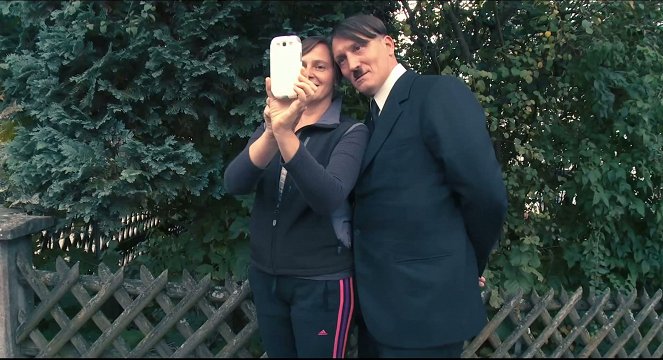Directed by:
David WnendtCinematography:
Hanno LentzComposer:
Enis RotthoffCast:
Oliver Masucci, Fabian Busch, Gerdy Zint, Lars Rudolph, Franziska Wulf, Christoph Maria Herbst, Thomas Thieme, Katja Riemann, Michael Ostrowski (more)Plots(1)
Der Führer is back. It is present day summer and Adolf Hitler suddenly wakes up on the site of his former bunker, now a residential area of Berlin, 70 years after his presumed demise. The war is over, his party is no more, his beloved Eva is not there to console him and the present German society is so multicultural he does not recognize it. But, against all the odds, Adolf Hitler begins a new career on television because he is universally mistaken for a brilliant comedian – even though he is indeed the genuine article and his intentions have not changed. (Berlinale)
(more)Videos (2)
Reviews (5)
Pat and Mat doing politically incorrect comedy. So what if Pat can't make movies and Mat isn't funny. The very initial problem is that the film doesn't feature the German Hitler of the 1930s, as he liked to pretend to be, but an internet-based, thousand-times memed android of our own making as a result of society's embargo on historical ambivalence. Only as such does he attempt to function as both a comic and instructive figure, while failing to do so as anything other than an utter construct that does things only to drive the plot and perpetuate socially desirable controversy. The most problematic aspect, however, is the method of the mirror to nature, which mixes what are probably real shots of people reacting to Hitler (who, by the way, doesn't look much like the real Hitler) with scenes that try to look like they were filmed with a camera present documenting the action, which the untrained eye cannot distinguish. If the filmmakers have chosen to push the central idea of the eternal Hitler in this way, and present it to the viewer by shamelessly combining reality with fiction without bothering to separate these elements from each other, they are committing irresponsible hogwash, no matter how grand their ideas are supposed to be.
()
It took me a while to understand that the creators jumped on the wave of Borats and Brunos. Only with the difference that the main character here is Adolf Hitler. Also thanks to this I respect the idea and the concept, which is flawless. During the movie, I felt sick because of how many Nazi-like qualities Germans still have. We all know about it, or at least suspect it, but until you see it, you can only guess. Well, and this finding was enough for me as a current testimony of one nation. It is also the only positive thing about the movie. The movie itself actually isn’t very funny, it is unnecessarily long, and the story is more of an accessory to the discovered findings. But you can be sure they will not do you any good. And you will even live to see an ironic comment about our country…
()
I got what I kind of expected. It's not as twisted as "Borat", but at times the social critique is just as impactful, maybe even more so. I don't know how much of it is staged, but I still think that unfortunately, Hitler still has his supporters among us. Entertaining and brought to a perfectly depressing end.
()
Definitely a matter that has an idea, clear evidence that if the creator wants to warn about something, they should do so in the form of comedy, because the impact is greater. On the other hand, Germans should stop constantly apologizing for their ancestors, grandparents, and great-grandparents, especially those who did not hesitate to take advantage of anything and anyone from the former Reich after the war (for example, the American rocket program built on Werner von Braun or former SS members fighting in the Foreign Legion in French Indochina). Well, comedy and so much to contemplate...
()
This clever satire responds to the global phenomenon of Hitler, who has been living a second life since 1945. There have always been many ways to deal with the infamous legacy of National Socialism. Hitler has become a caricature and an object of research in every conceivable respect. TV stations present documentaries about all the banalities of everyday life from 1933 to 1945. The youth of Adolf Hitler is, of course, a separate topic. That's what we have all these movies like Hitler: The Rise of Evil (2003) or the stage adaptation of "Mein Kampf" (2009). This time the parallel with today's popular formats, brought to popularity by Sacha Baron Cohen, comes into play. Fortunately, the result is not on the level of a cheap tale, because thanks to the in-depth research the work is chillingly authentic. The potential for the return of evil is always there.
()



Ads